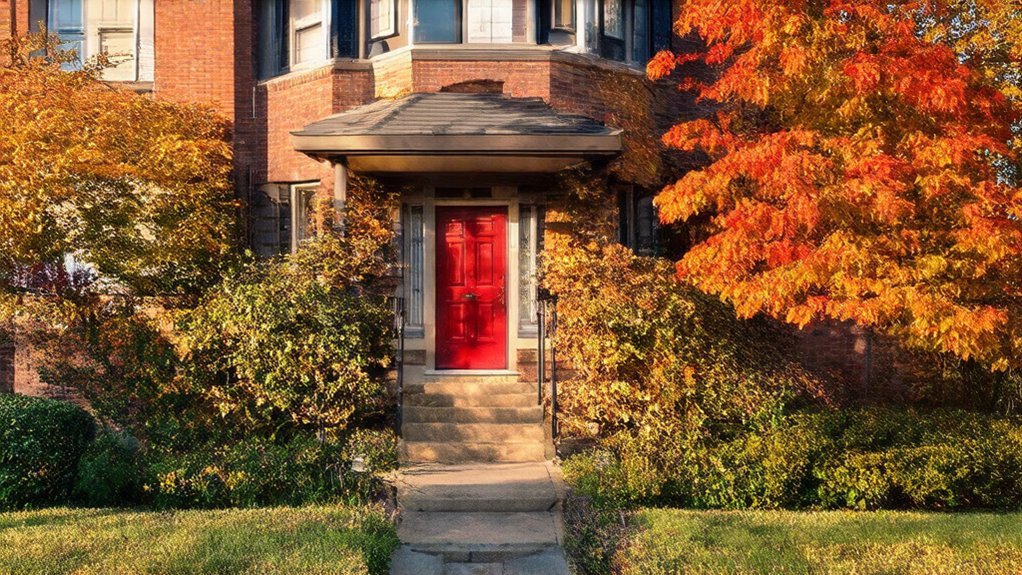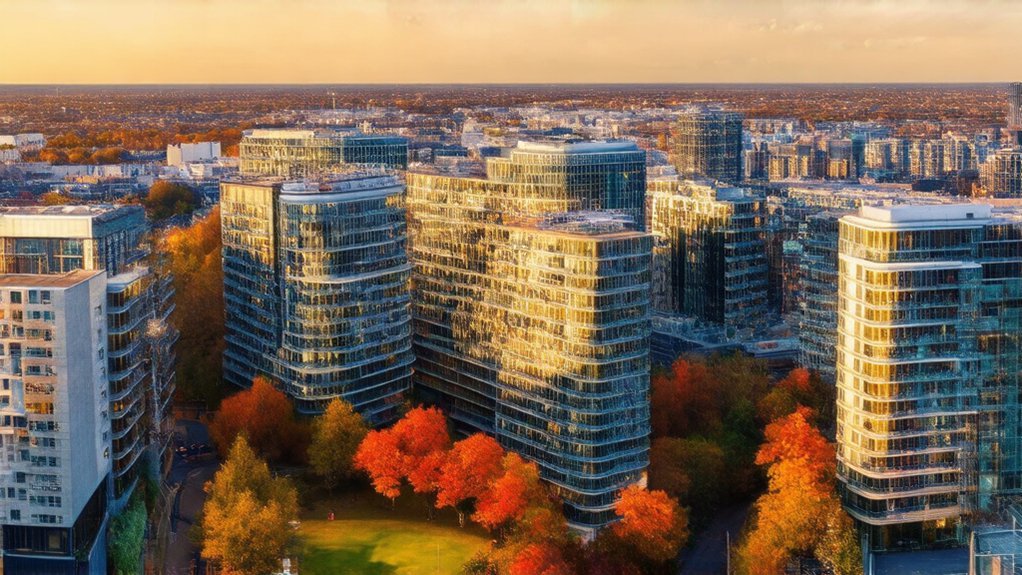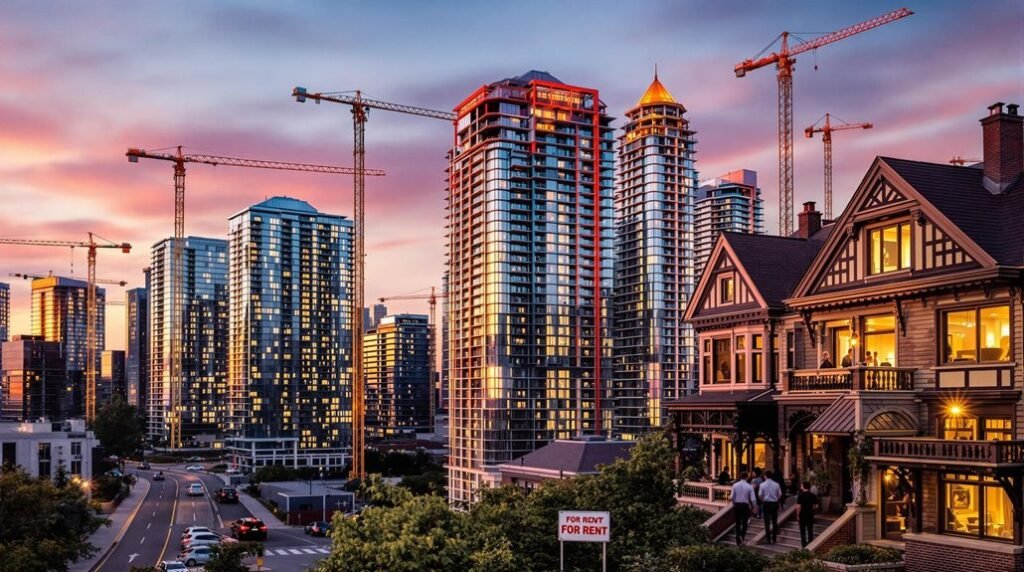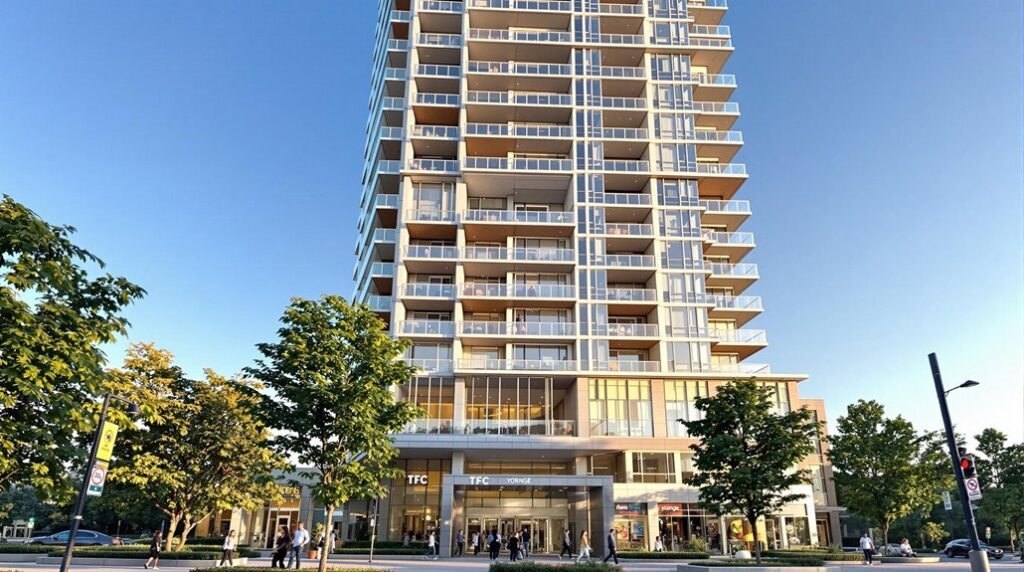To buy your first home in Toronto, you’ll need to understand key financial requirements. Your GDS ratio should stay under 39% and TDS under 44% for mortgage approval. You’ll need a minimum 5% down payment for homes under $500,000, with higher requirements for pricier properties. A credit score of 650+ will help secure better mortgage rates. First-time buyers can access programs like the Home Buyers’ Plan ($60,000 RRSP withdrawal) and First-Time Home Buyer Incentive for purchase assistance. Monthly costs include property taxes ($4,233/year average), utilities ($250-350), and maintenance ($1,880). The path to homeownership becomes clearer as you explore each requirement in detail.
Key Takeaways
- Save at least 5% down payment for homes under $500,000, but aim for 20% to avoid mortgage default insurance costs.
- Ensure credit score exceeds 640 and maintain debt ratios below 39% GDS and 44% TDS for optimal mortgage approval chances.
- Utilize the First-Time Home Buyer Incentive and FHSA to access up to $40,000 in tax-advantaged savings for your purchase.
- Budget beyond mortgage payments for property taxes, utilities, and maintenance costs, averaging $1,880 monthly for Toronto homes.
- Secure mortgage pre-approval before house hunting to understand borrowing limits and strengthen negotiating position with sellers.
Understanding GDS and TDS Ratios

Debt service ratios play an essential role in determining your mortgage eligibility in Toronto’s housing market. Sound financial planning helps maintain healthy debt ratios for long-term stability.
Pre-approval process can strengthen your credibility with sellers and streamline your home search. Your GDS ratio focuses on housing costs. It includes your potential mortgage payments, property taxes, heating expenses, and half of any condo fees. Most lenders want to see your GDS stay under 39% of your gross income. You can calculate this by dividing your total housing costs by your annual gross income and multiplying by 100.
The TDS ratio takes a broader view of your financial obligations. It combines your housing costs with other debt payments including:
- Car loans
- Credit card balances
- Student loans
- Support payments
- Lines of credit
Good credit scores can help you qualify even with higher debt ratios. You’ll need to understand two key measurements: the Gross Debt Service (GDS) ratio and the Total Debt Service (TDS) ratio. These numbers help lenders assess if you can manage your mortgage payments.
Lenders typically prefer your TDS ratio to remain below 44%. This guarantees you won’t be overwhelmed by debt payments.
You can improve these ratios through several strategies. Consider making a larger down payment to reduce your mortgage amount. Pay off existing debts to lower your TDS ratio.
You might also look for properties with lower carrying costs. If your ratios are too high, work with a mortgage broker. They can help you explore options or find lenders who offer more flexibility based on your credit history and income stability.
Getting Your Credit Score Ready

A strong credit score stands as your gateway to better mortgage terms in Toronto’s competitive housing market. Most lenders require a minimum score of 640 but prime lenders typically look for 650 or higher. Your credit score will directly impact your interest rates and loan options. A 20-point drop in your credit score can significantly affect your mortgage rate pricing. Credit scores typically peak between 750-799 for most borrowers.
To prepare your credit score for a mortgage application you’ll need to focus on these key areas:
- Payment History
- Make all your bill payments on time
- Set up automatic payments to avoid late fees
- Address any past-due accounts immediately
- Credit Utilization
- Keep credit card balances below 30% of your limits
- Pay down existing debt systematically
- Avoid maxing out credit cards
- Credit Management
- Don’t apply for new credit cards or loans
- Maintain older credit accounts to show history
- Mix different types of credit responsibly
Your debt-to-income ratio plays a significant role alongside your credit score. Lenders prefer to see a DTI of 43% or lower. You can calculate this by dividing your monthly debt payments by your gross monthly income. The First Home Savings Account can help you build a stronger financial profile while saving for your down payment.
Start improving your score at least six months before applying for a mortgage. Check your credit report for errors and dispute any inaccuracies.
If your score falls below 640 focus on making consistent payments and reducing debt. Remember that credit scores aren’t the only factor lenders consider. Your income stability and down payment size also influence your mortgage approval chances.
Down Payment Requirements

Understanding Toronto’s down payment requirements typically serves as the first essential step in your home-buying journey. The amount you’ll need depends on your target home’s purchase price. Let’s break down the key requirements.
For homes priced up to $500,000, you’ll need a minimum down payment of 5%. This means you’ll pay $25,000 on a $500,000 home. You’ll require mortgage default insurance if your down payment is less than 20%. Starting early with dedicated savings accounts can help you reach your down payment goals more effectively. The First Home Savings Account offers an excellent tax-free savings opportunity up to $40,000 for your home purchase.
When buying a property between $500,000 and $999,999, you’ll face a tiered system:
- Pay 5% on the first $500,000
- Pay 10% on the remaining amount above $500,000
For example, a $700,000 home requires $45,000 down ($25,000 for the first $500,000 plus $20,000 for the remaining $200,000).
Properties priced at $1 million or more demand a 20% minimum down payment. This means you’ll need at least $200,000 down on a $1 million home. These purchases don’t require mortgage default insurance. Several non-profit organizations in Toronto work collaboratively to help make homeownership more accessible through various assistance programs.
If you’re working with alternative or B lenders, you’ll need at least 20% down regardless of the purchase price. This requirement applies even to lower-priced homes. Self-employed buyers or those with lower credit scores might face higher down payment requirements.
Remember that down payment assistance programs exist for first-time buyers. Making a larger down payment can reduce your monthly mortgage payments and potentially secure better interest rates.
Government Incentives for First-Time Buyers
Toronto’s home-buying landscape offers several government incentives designed to make property ownership more accessible for first-time buyers. You’ll need to save for a down payment period that averages 21 years in Toronto. You’ll find considerable financial support through programs that can help reduce your initial costs and make homeownership more attainable.
The Home Buyers’ Plan lets you borrow up to $60,000 from your RRSP tax-free for your home purchase. You’ll need to repay this amount to your RRSP within 15 years starting from the second year after withdrawal. This can be a valuable source for your down payment or closing costs. You must occupy within one year of purchasing your home to qualify. CMHC provides mortgage calculators to help determine your maximum borrowing capacity.
The First-Time Home Buyer Incentive provides shared-equity funding of 5-10% of your purchase price. You won’t pay interest on this amount but must repay it when you sell or after 25 years. Your household income needs to stay under $120,000 to qualify.
Consider these additional programs to maximize your savings:
- First Home Savings Account (FHSA): You can contribute up to $8,000 annually with a $40,000 lifetime limit. Your contributions are tax-deductible and withdrawals for home purchases are tax-free.
- Home Buyers’ Tax Credit: You’ll receive a 15% tax credit on up to $10,000 of your home purchase costs resulting in a maximum $1,500 benefit.
- Combined Benefits: You can use multiple programs together to increase your purchasing power and reduce your initial costs.
These incentives work together to create a thorough support system for first-time buyers. Each program has specific eligibility requirements and deadlines you’ll need to meet. Understanding these options can greatly impact your home-buying journey in Toronto.
Pre-Approval Steps That Matter

While government incentives can help fund your home purchase, getting pre-approved for a mortgage marks your first practical step toward homeownership in Toronto. Showing a pre-approval demonstrates your serious intent to sellers.
The pre-approval process involves four essential stages you’ll need to complete:
1. Initial Contact and Assessment
You’ll meet with a mortgage professional to discuss your financial situation. They’ll evaluate your needs and outline potential challenges. Using screen sharing tools, your broker can walk through scenario calculations to demonstrate your borrowing options.
You’ll receive guidance on required documents and learn about your credit report‘s impact on the process.
2. Document Collection
You’ll need to gather vital paperwork including:
- Two pieces of ID (passport or driver’s license)
- Income verification (pay stubs, job letter, T4s)
- Asset documentation (bank statements)
- Details about your current debts
- Proof of down payment funds
3. Pre-Approval Application
You’ll submit a formal application to your chosen mortgage broker or lender. They’ll review your credit report and supporting documents.
You’ll receive confirmation of your eligibility and potential lender options. Your pre-approval will typically last 90 days with a guaranteed interest rate.
4. Post-Pre-Approval Steps
Once pre-approved, you can begin your property search. After finding a home, you’ll submit the purchase agreement and MLS listing to your lender.
They’ll provide an electronic commitment letter outlining conditions. You’ll need to fulfill these conditions by providing final documentation about your income, employment, and the property details.
Choosing Your Mortgage Term

Mortgage term selection ranks among the most critical decisions you’ll make when securing a home loan in Toronto. Your choice will determine both your interest rate stability and payment flexibility over the years ahead. Interest rates vary significantly between shorter and longer terms.
You’ll need to contemplate whether a closed, open, or convertible mortgage term aligns with your financial goals. Fixed-rate closed mortgages offer predictable payments throughout your term. You won’t face surprises when markets fluctuate but you’ll have less flexibility for early repayment. Mortgage brokers can provide expert guidance in selecting the most suitable term for your situation. With average home prices exceeding $1 million in North York, choosing the right mortgage term is especially crucial for financial planning.
Variable-rate options can save you money when rates drop but require comfort with changing payments. Most Toronto homebuyers choose five-year terms to balance stability with competitive rates.
Key factors to evaluate when selecting your mortgage term:
- Payment stability – Fixed rates keep your payments constant while variable rates change with market conditions
- Term length – Shorter terms offer more frequent renewal opportunities but may expose you to rate increases sooner
- Prepayment options – Open mortgages allow unrestricted principal payments while closed terms have limits
Your amortization period works alongside your term choice to shape your monthly payments. Longer amortization periods reduce your monthly obligation but increase your total interest cost.
If you make a down payment under 20% your maximum amortization is 25 years. With over 20% down you can stretch to 30 years. Reflect on your long-term financial picture when balancing these options.
Your mortgage term decision will impact your budget for years to come.
Hidden Costs of Home Ownership

Homebuyers often focus solely on their mortgage payments while overlooking the considerable hidden costs of ownership.
You’ll need to budget for several major expense categories that can greatly impact your monthly finances.
Ontario’s rental deposit rules limit landlords to collecting only one month’s rent, but homeowners face much steeper upfront costs.
Let’s break down these hidden costs:
- Closing and Initial Costs
- You’ll pay realtor commissions
- Bank underwriting fees apply
- GST/HST and QST taxes must be covered
- Legal fees are mandatory
- Land transfer tax varies by province
- Property Taxes and Insurance
- Property taxes can reach $4,233 annually on a $600,000 home in Toronto
- Home insurance costs $100-150 monthly
- Tax rates differ by location within Ontario
- Insurance rates change based on risk factors
- Monthly Utilities and Services
- Hydro bills range from $125-200 for a three-bedroom home
- Gas costs average $125-150 monthly
- Water and waste services run $600-750 yearly
- Internet and TV services add about $180 monthly
- Ongoing Maintenance
- Set aside $1,880 monthly for emergency repairs and maintenance
- Budget for appliance repairs and replacements
- Plan for regular seasonal maintenance
- Consider future renovation costs
Most appliances in your home will need replacement every 5 to 15 years depending on usage and quality.
First-time buyers can withdraw up to $60,000 from RRSPs tax-free through the Home Buyers Plan to help cover these expenses.
You’ll need to factor these expenses into your home-buying budget.
They’re just as important as your mortgage payment and can’t be ignored when calculating affordability.
Smart planning includes creating separate savings accounts for each category.
This helps guarantee you won’t face financial strain when these costs arise.
Working With Real Estate Professionals

Selecting the right real estate professional can make or break your home-buying journey in Toronto’s competitive market. Your agent should have extensive experience with first-time buyers and a deep understanding of current market trends. They’ll need to explain complex market dynamics and help you navigate the competitive Toronto real estate landscape. A realtor’s ability to use digital platforms keeps transactions moving smoothly in today’s market.
You’ll want to verify your agent’s knowledge of specific neighborhoods like Liberty Village and Yorkville. They should provide detailed insights about pricing trends, market inventory, and upcoming developments in your areas of interest. A qualified agent will understand local real estate laws and keep you informed about regulations that affect your purchase. Market experience is crucial in a city where demand consistently outpaces supply. They can assess property appreciation potential through analysis of neighborhood developments and market indicators.
- Look for proven negotiation skills, especially in handling multiple offer situations.
- Verify their track record with recent successful transactions in your target neighborhoods.
- Check their professional network of mortgage brokers, home inspectors, and contractors.
Your agent’s ability to communicate effectively throughout the buying process is vital. They should respond promptly to your questions and keep you updated on new listings that match your criteria.
You’ll benefit from their access to market data and professional resources that aren’t readily available to the public.
Don’t hesitate to ask for references from recent clients or review online testimonials. The right agent will help determine appropriate offering prices based on market conditions and protect your interests during negotiations.
Their professional network can connect you with trusted service providers throughout your home-buying journey.
Toronto Neighborhood Price Comparisons
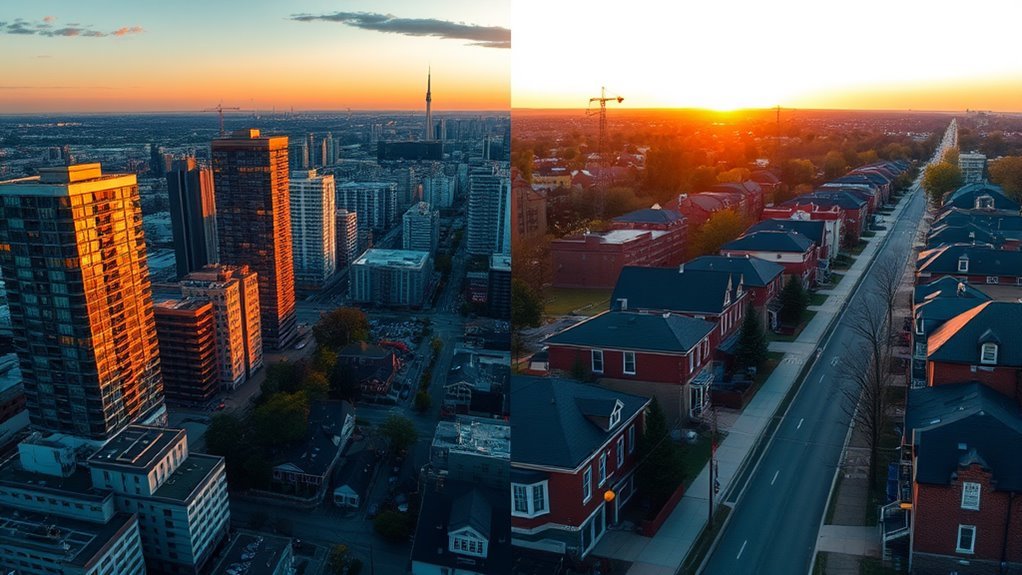
Nearly every Toronto neighborhood presents a unique financial equation when comparing rental costs to mortgage payments.
You’ll find significant variations across different areas of the city that can impact your housing decisions. Getting mortgage pre-approval first strengthens your position in these competitive areas.
Let’s examine the key price differences in Toronto’s neighborhoods:
- Premium Areas
- York Mills-Bridle Path-Hoggs Hollow shows the largest gap with mortgage payments averaging $2,631 more than rent.
- Rosedale-Moore Park follows with mortgages costing $1,900 more than rent.
- These areas clearly favor renting from a monthly cost perspective.
With luxury home prices reaching $2.8 million in these neighborhoods, the rental advantage becomes even more pronounced.
2. Balanced Neighborhoods
- High Park-Swansea, Roncesvalles, and Parkdale have just a $10 difference between renting and buying.
- Yorkville, Annex, and Summerhill show a mere $23 gap.
- About 17% of Toronto neighborhoods maintain this close balance.
3. Ownership Advantages
- Willowridge-Martingrove-Richview offers savings of $549 when buying versus renting.
- Black Creek and York University Heights provide the most affordable mortgage payments at $2,281.
Rockcliffe-Smythe-Keelesdale-Eglinton West offers the lowest average rent at $2,298.
Current market trends show an average home price of $1,060,300 with condos averaging $650,000.
Single-family homes sit at $1,280,200. The average rent stands at $2,642.
You’ll find renting is more affordable in 77% of Toronto neighborhoods. However, specific areas buck this trend and offer better value for buyers.
The market’s 43% sales-to-new-listings ratio indicates balanced conditions.
This means you’ll have room to negotiate whether you’re planning to rent or buy.
Conclusion
You’re now equipped with essential knowledge to navigate Toronto’s mortgage landscape. Remember to keep your GDS and TDS ratios in check and maintain a strong credit score. Your down payment options and government incentives can greatly impact your purchasing power. Take time to compare neighborhoods and factor in all ownership costs. When you’re ready, work with trusted professionals to make your first home purchase a success.










